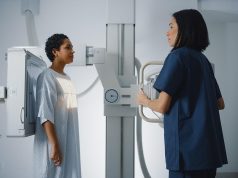After propensity-score adjustment, no significant difference in overall survival versus chemoradiation
THURSDAY, Aug. 30, 2018 (HealthDay News) — For older patients with stage I squamous cell carcinoma of the anus, radiation alone is associated with outcomes that do not differ significantly from those of chemoradiation, according to research published in the July issue of Diseases of the Colon & Rectum.
Michael Buckstein, M.D., Ph.D., from the Icahn School of Medicine at Mount Sinai in New York City, and colleagues conducted a cohort analysis to examine whether outcomes are improved with the addition of chemotherapy to radiation alone for stage I squamous cell carcinoma of the anus. Data were included for 200 patients who received chemoradiation and 99 treated with lone radiotherapy (median age, 72 years).
The researchers found that, compared to patients treated with lone radiotherapy, patients receiving chemoradiation had improved unadjusted overall survival; however, after propensity-score method adjustment, there was no significant between-group difference in overall survival (hazard ratio, 0.7; 95 percent confidence interval, 0.4 to 1), cause-specific survival (hazard ratio, 0.7; 95 percent confidence interval, 0.3 to 1.6), colostomy-free survival (hazard ratio, 1.1; 95 percent confidence interval, 0.5 to 2.5), or disease-free survival (hazard ratio, 0.9; 95 percent confidence interval, 0.6 to 1.4). The risk of select early and late toxicities was increased in association with chemoradiation.
“Lone radiation may be associated with adequate oncologic outcomes when used to treat older and sicker patients with stage I anal cancer,” the authors write.
Several authors disclosed financial ties to the pharmaceutical industry.
Copyright © 2018 HealthDay. All rights reserved.








